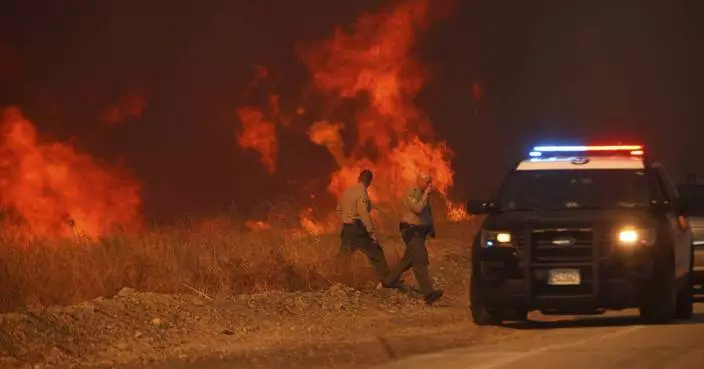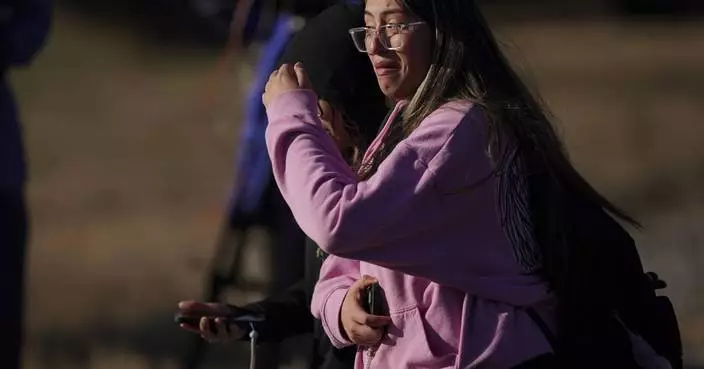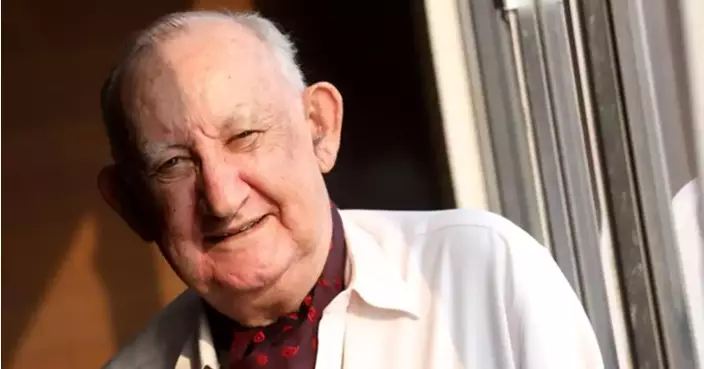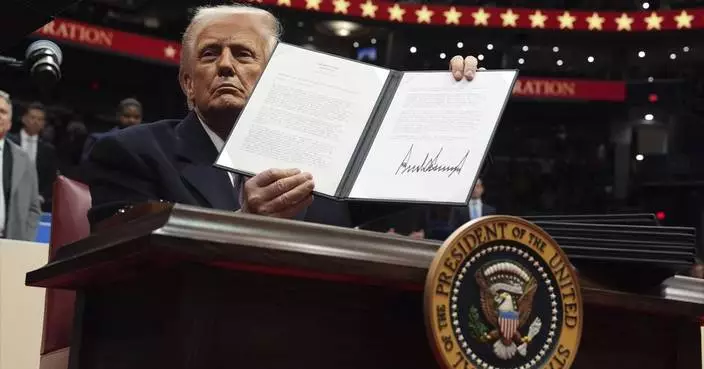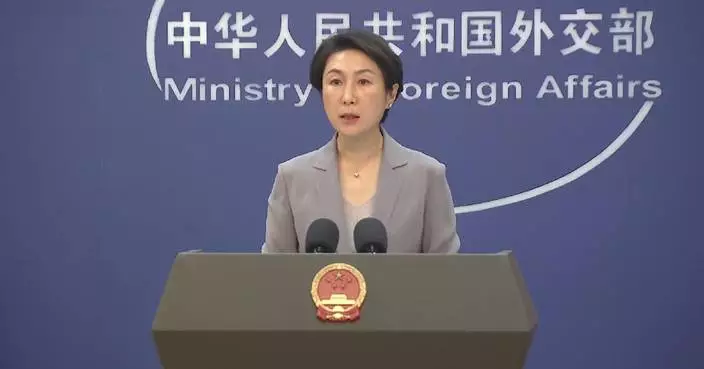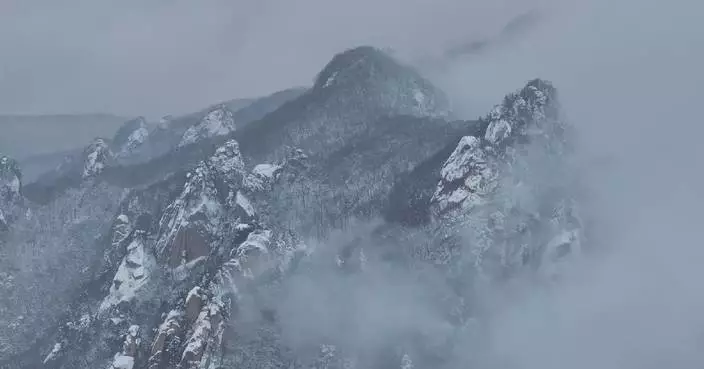PARIS (AP) — Russian players Mirra Andreeva and Diana Shnaider gave the group competing as Individual Neutral Athletes, known by the French acronym AIN, a chance of a tennis gold medal at the Paris Olympics by winning Friday to reach the women's doubles final.
Andreeva, who is 17, and Shnaider, a 20-year-old who played one season of college tennis at North Carolina State, beat the eighth-seeded team of Cristina Bucsa and Sara Sorribes Tormo of Spain 6-1, 6-2 in the semifinals.
Click to Gallery
Mirra Andreeva and Diana Shnaider of Individual Neutral Athlete celebrate their victory over Cristina Bucsa and Sara Sorribes Tormo of Spain during women's doubles semifinals tennis match at the Roland Garros stadium, at the 2024 Summer Olympics, Friday, Aug. 2, 2024, in Paris, France. (AP Photo/Manu Fernandez)
Diana Shnaider, down, returns the ball next to her teammate Mirra Andreeva of Individual Neutral Athlete compete against Cristina Bucsa and Sara Sorribes Tormo of Spain during women's doubles semifinals tennis match at the Roland Garros stadium, at the 2024 Summer Olympics, Friday, Aug. 2, 2024, in Paris, France. (AP Photo/Manu Fernandez)
Mirra Andreeva and Diana Shnaider of Individual Neutral Athlete celebrate their victory over Cristina Bucsa and Sara Sorribes Tormo of Spain during women's doubles semifinals tennis match at the Roland Garros stadium, at the 2024 Summer Olympics, Friday, Aug. 2, 2024, in Paris, France. (AP Photo/Manu Fernandez)
Mirra Andreeva and Diana Shnaider of Individual Neutral Athlete celebrate their victory over Cristina Bucsa and Sara Sorribes Tormo of Spain during women's doubles semifinals tennis match at the Roland Garros stadium, at the 2024 Summer Olympics, Friday, Aug. 2, 2024, in Paris, France. (AP Photo/Manu Fernandez)
Mirra Andreeva and Diana Shnaider of Individual Neutral Athlete celebrate their victory over Cristina Bucsa and Sara Sorribes Tormo during women's doubles semifinals tennis match at the Roland Garros stadium, at the 2024 Summer Olympics, Friday, Aug. 2, 2024, in Paris, France. (AP Photo/Manu Fernandez)
Russia and Belarus were banned by the International Olympic Committee from team sports at the Paris Games because of the war in Ukraine that began in February 2022. Individual athletes with Russian or Belarusian passports were allowed to compete as neutrals if they qualified and then were approved for entry to the Olympics.
“We’re going to do everything possible to win,” Andreeva said. “It’s a great, great feeling, because we know we’re going to bring home a medal, anyway. Of course, it would be amazing if we would be able to bring home a gold medal.”
Andreeva and Shnaider, who were holding celebratory ice cream cones while being interviewed, are wearing all-white uniforms, with none of the flags or other markings used by other tennis players at the Olympics. Shnaider said her outfit is the one she used last month at Wimbledon, which has a policy mandating white clothing.
They now know they'll leave France with no worse than a silver medal. They will face Sara Errani and Jasmine Paolini of Italy in the final on Sunday.
“We're very excited,” Shnaider said. “We're going to go for it."
On Friday, Ivan Litvinovich and Viyaleta Bardzilouskaya, both of Belarus, won the first medals by AIN athletes at the Paris Olympics, both in trampoline. Litvinovich claimed gold for the men, and Bardzilouskaya got the women's silver.
Shnaider, whose family lives in Moscow, and Andreeva, whose training base is in Cannes, France, eliminated the second-seeded pairing of Katerina Siniakova and Barbora Krejcikova of the Czech Republic — the Tokyo Olympics champions — in the quarterfinals.
After that win, the Russians were asked how it felt not to be able to represent their country at the Olympics.
“For me, it does not matter. I just go out there and play,” Andreeva said. “It just doesn’t matter what is happening outside of tennis.”
Andreeva reached her first Grand Slam singles semifinal at the French Open in June. That tournament is played at the same Roland Garros clay-court facility being used for tennis during the Paris Games.
Associated Press Writer Tom Nouvian contributed to this report.
AP Summer Olympics: https://apnews.com/hub/2024-paris-olympic-games
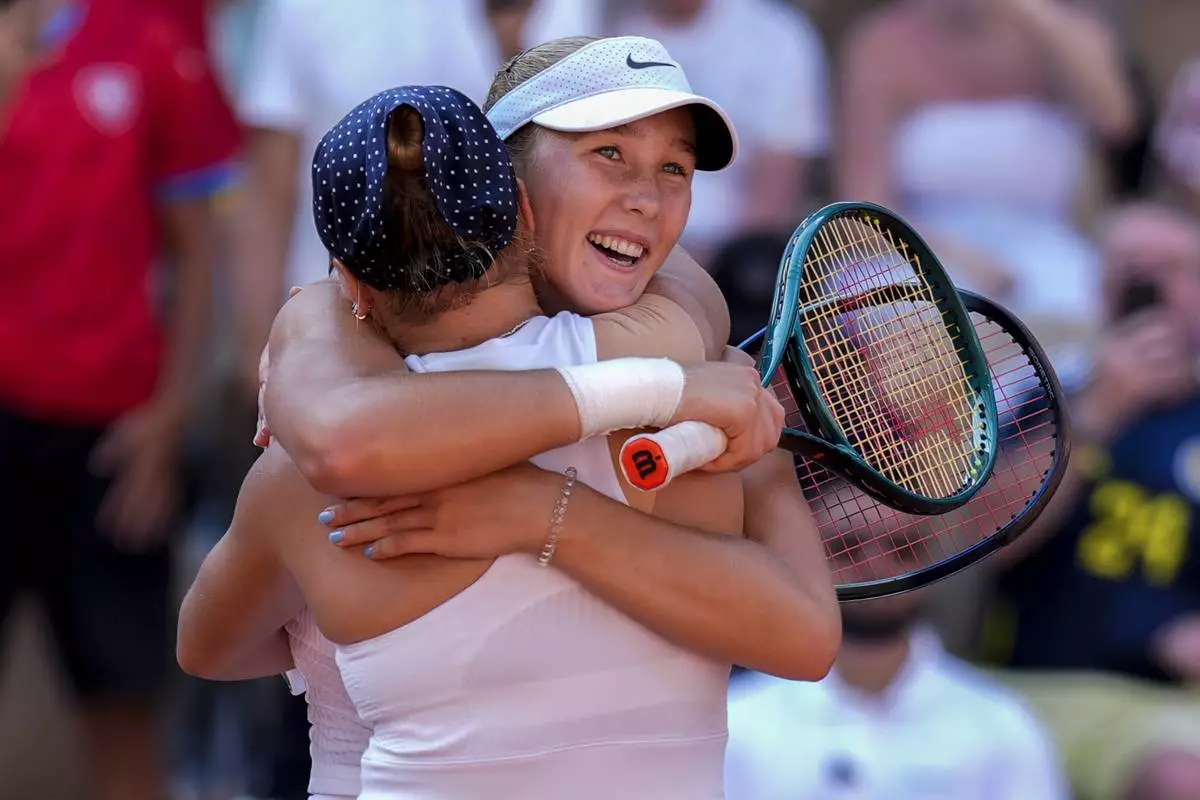
Mirra Andreeva and Diana Shnaider of Individual Neutral Athlete celebrate their victory over Cristina Bucsa and Sara Sorribes Tormo of Spain during women's doubles semifinals tennis match at the Roland Garros stadium, at the 2024 Summer Olympics, Friday, Aug. 2, 2024, in Paris, France. (AP Photo/Manu Fernandez)
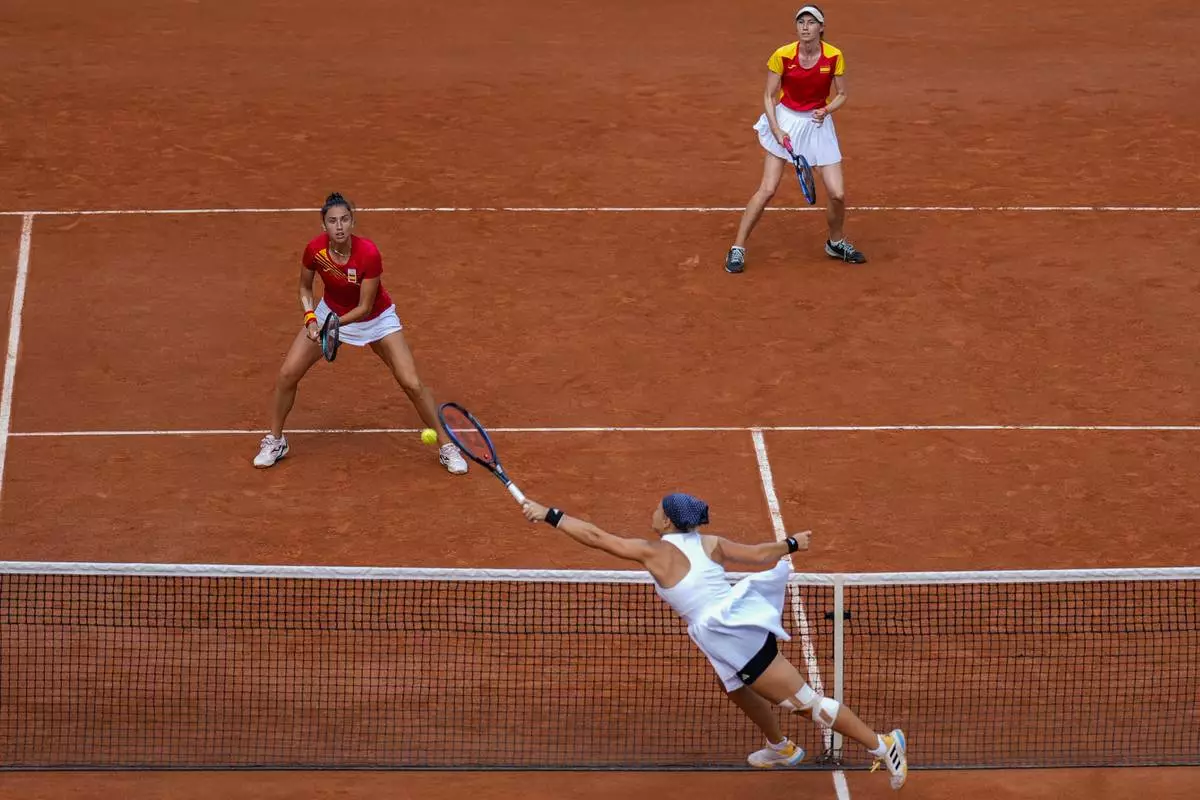
Diana Shnaider, down, returns the ball next to her teammate Mirra Andreeva of Individual Neutral Athlete compete against Cristina Bucsa and Sara Sorribes Tormo of Spain during women's doubles semifinals tennis match at the Roland Garros stadium, at the 2024 Summer Olympics, Friday, Aug. 2, 2024, in Paris, France. (AP Photo/Manu Fernandez)

Mirra Andreeva and Diana Shnaider of Individual Neutral Athlete celebrate their victory over Cristina Bucsa and Sara Sorribes Tormo of Spain during women's doubles semifinals tennis match at the Roland Garros stadium, at the 2024 Summer Olympics, Friday, Aug. 2, 2024, in Paris, France. (AP Photo/Manu Fernandez)
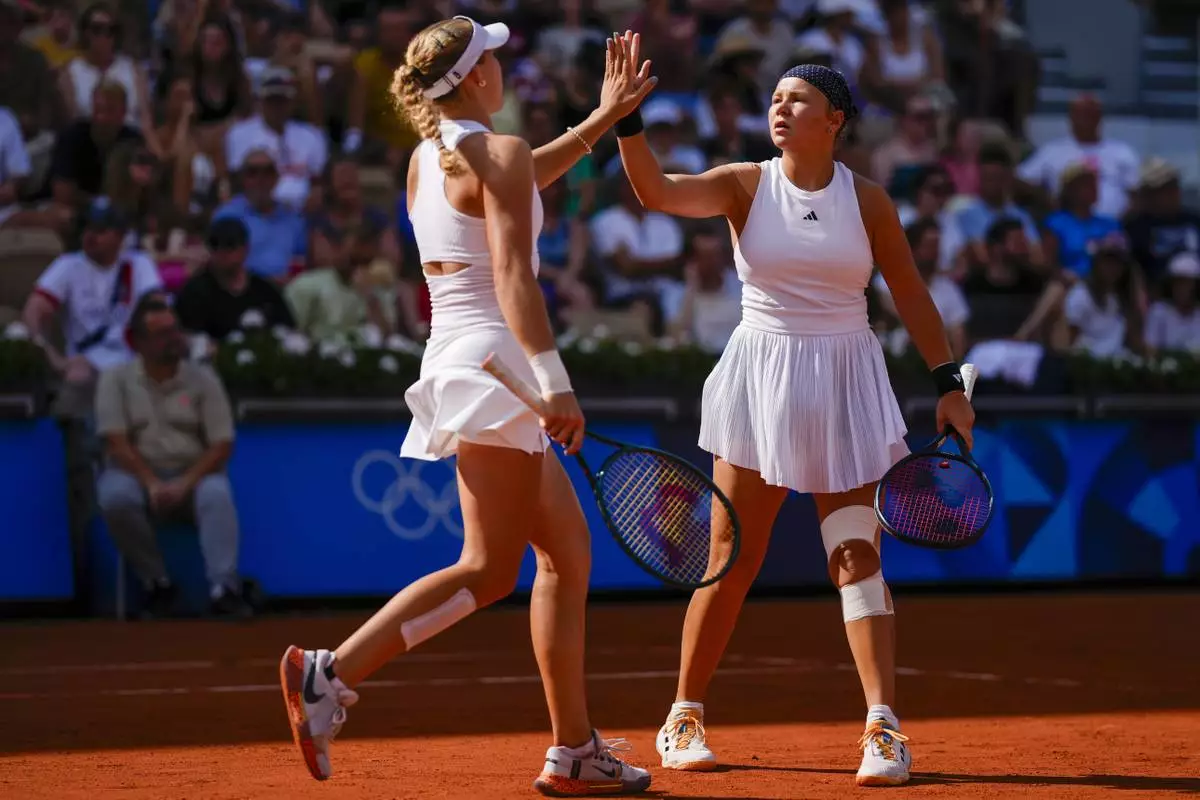
Mirra Andreeva and Diana Shnaider of Individual Neutral Athlete celebrate their victory over Cristina Bucsa and Sara Sorribes Tormo of Spain during women's doubles semifinals tennis match at the Roland Garros stadium, at the 2024 Summer Olympics, Friday, Aug. 2, 2024, in Paris, France. (AP Photo/Manu Fernandez)

Mirra Andreeva and Diana Shnaider of Individual Neutral Athlete celebrate their victory over Cristina Bucsa and Sara Sorribes Tormo during women's doubles semifinals tennis match at the Roland Garros stadium, at the 2024 Summer Olympics, Friday, Aug. 2, 2024, in Paris, France. (AP Photo/Manu Fernandez)
What's in a name change, after all?
The water bordered by the Southern United States, Mexico and Cuba will be critical to shipping lanes and vacationers whether it’s called the Gulf of Mexico, as it has been for four centuries, or the Gulf of America, as President Donald Trump ordered this week. North America’s highest mountain peak will still loom above Alaska whether it’s called Mt. Denali, as ordered by former President Barack Obama in 2015, or changed back to Mt. McKinley as Trump also decreed.
But Trump's territorial assertions, in line with his “America First” worldview, sparked a round of rethinking by mapmakers and teachers, snark on social media and sarcasm by at least one other world leader. And though Florida Gov. Ron DeSantis put the Trumpian “Gulf of America” on an official document and some other gulf-adjacent states were considering doing the same, it was not clear how many others would follow Trump's lead.
Mexican President Claudia Sheinbaum joked that if Trump went ahead with the renaming, her country would rename North America “Mexican America.” On Tuesday, she toned it down: “For us and for the entire world it will continue to be called the Gulf of Mexico.”
Map lines are inherently political. After all, they're representations of the places that are important to human beings — and those priorities can be delicate and contentious, even more so in a globalized world.
There’s no agreed-upon scheme to name boundaries and features across the Earth.
“Denali” is the mountain's preferred name for Alaska Natives, while “McKinley" is a tribute to President William McKinley, designated in the late 19th century by a gold prospector. China sees Taiwan as its own territory, and the countries surrounding what the United States calls the South China Sea have multiple names for the same body of water.
The Persian Gulf has been widely known by that name since the 16th century, although usage of “Gulf” and “Arabian Gulf” is dominant in many countries in the Middle East. The government of Iran — formerly Persia — threatened to sue Google in 2012 over the company’s decision not to label the body of water at all on its maps. Many Arab countries don’t recognize Israel and instead call it Palestine. And in many official releases, Israel calls the occupied West Bank by its biblical name, “Judea and Samaria.”
Americans and Mexicans diverge on what to call another key body of water, the river that forms the border between Texas and the Mexican states of Chihuahua, Coahuila, Nuevo Leon and Tamaulipas. Americans call it the Rio Grande; Mexicans call it the Rio Bravo.
Trump's executive order — titled “Restoring Names That Honor American Greatness” — concludes thusly: “It is in the national interest to promote the extraordinary heritage of our Nation and ensure future generations of American citizens celebrate the legacy of our American heroes. The naming of our national treasures, including breathtaking natural wonders and historic works of art, should honor the contributions of visionary and patriotic Americans in our Nation’s rich past.”
But what to call the gulf with the 3,700-mile coastline?
“It is, I suppose, an internationally recognized sea, but (to be honest), a situation like this has never come up before so I need to confirm the appropriate convention,” said Peter Bellerby, who said he was talking over the issue with the cartographers at his London company, Bellerby & Co. Globemakers. “If, for instance, he wanted to change the Atlantic Ocean to the American Ocean, we would probably just ignore it."
As of Wednesday night, map applications for Google and Apple still called the mountain and the gulf by their old names. Spokespersons for those platforms did not immediately respond to emailed questions.
A spokesperson for National Geographic, one of the most prominent map makers in the U.S., said this week that the company does not comment on individual cases and referred questions to a statement on its web site, which reads in part that it "strives to be apolitical, to consult multiple authoritative sources, and to make independent decisions based on extensive research.” National Geographic also has a policy of including explanatory notes for place names in dispute, citing as an example a body of water between Japan and the Korean peninsula, referred to as the Sea of Japan by the Japanese and the East Sea by Koreans.
In discussion on social media, one thread noted that the Sears Tower in Chicago was renamed the Willis Tower in 2009, though it's still commonly known by its original moniker. Pennsylvania's capital, Harrisburg, renamed its Market Street to Martin Luther King Boulevard and then switched back to Market Street several years later — with loud complaints both times. In 2017, New York's Tappan Zee Bridge was renamed for the late Gov. Mario Cuomo to great controversy. The new name appears on maps, but “no one calls it that,” noted another user.
“Are we going to start teaching this as the name of the body of water?” asked one Reddit poster on Tuesday.
“I guess you can tell students that SOME PEOPLE want to rename this body of water the Gulf of America, but everyone else in the world calls it the Gulf of Mexico,” came one answer. “Cover all your bases — they know the reality-based name, but also the wannabe name as well.”
Wrote another user: “I'll call it the Gulf of America when I'm forced to call the Tappan Zee the Mario Cuomo Bridge, which is to say never.”
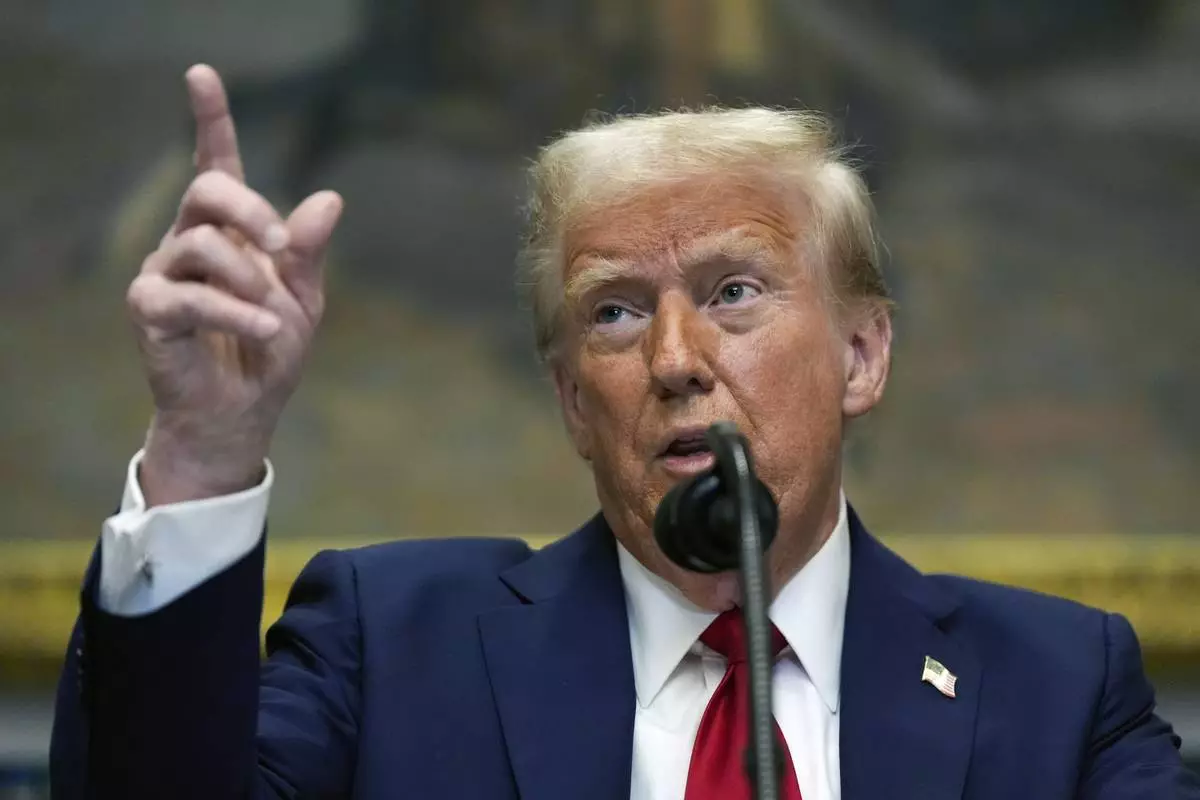
FILE - President Donald Trump speaks in the Roosevelt Room of the White House, Tuesday, Jan. 21, 2025, in Washington. (AP Photo/Julia Demaree Nikhinson, File)
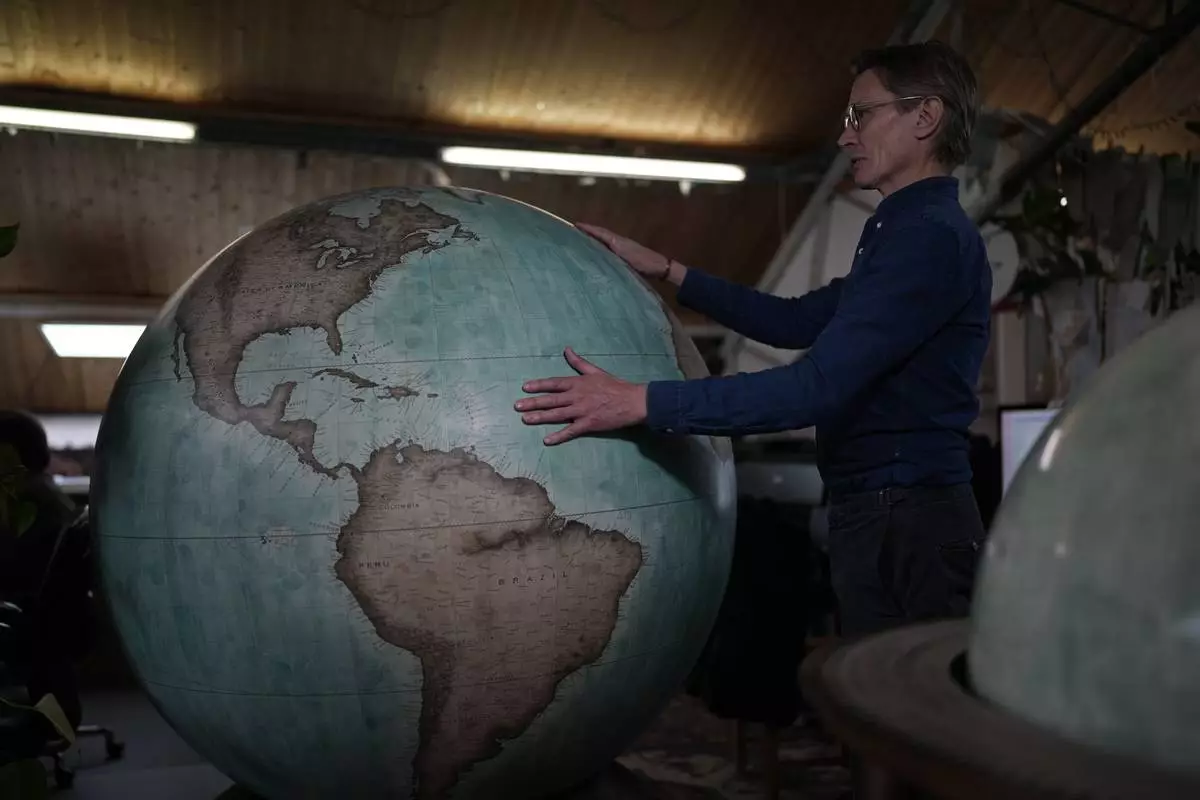
FILE - Peter Bellerby, the founder of Bellerby & Co. Globemakers, holds a globe at a studio in London, Tuesday, Feb. 27, 2024. (AP Photo/Kin Cheung, File)
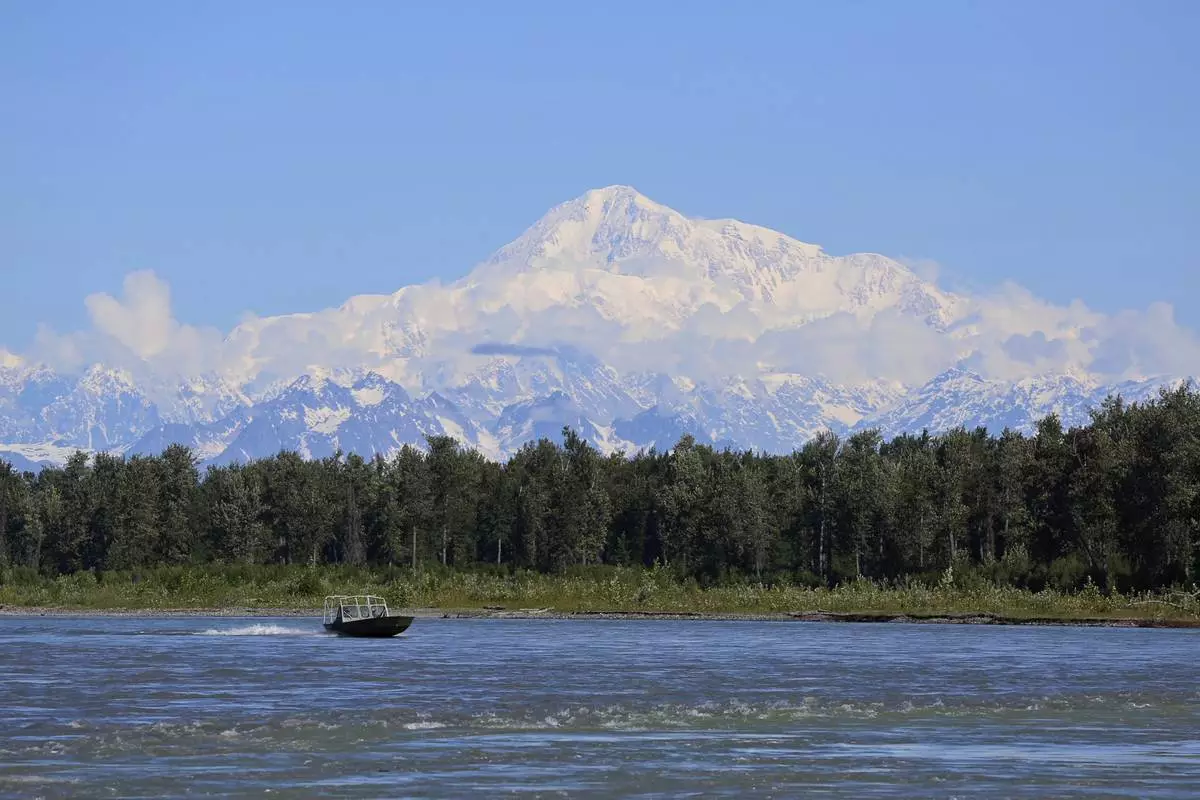
FILE - A boat is seen on the Susitna River near Talkeetna, Alaska, on Sunday, June 13, 2021, with Denali in the background. Denali, the tallest mountain on the North American continent, is located about 60 miles northwest of Talkeetna. (AP Photo/Mark Thiessen, File)
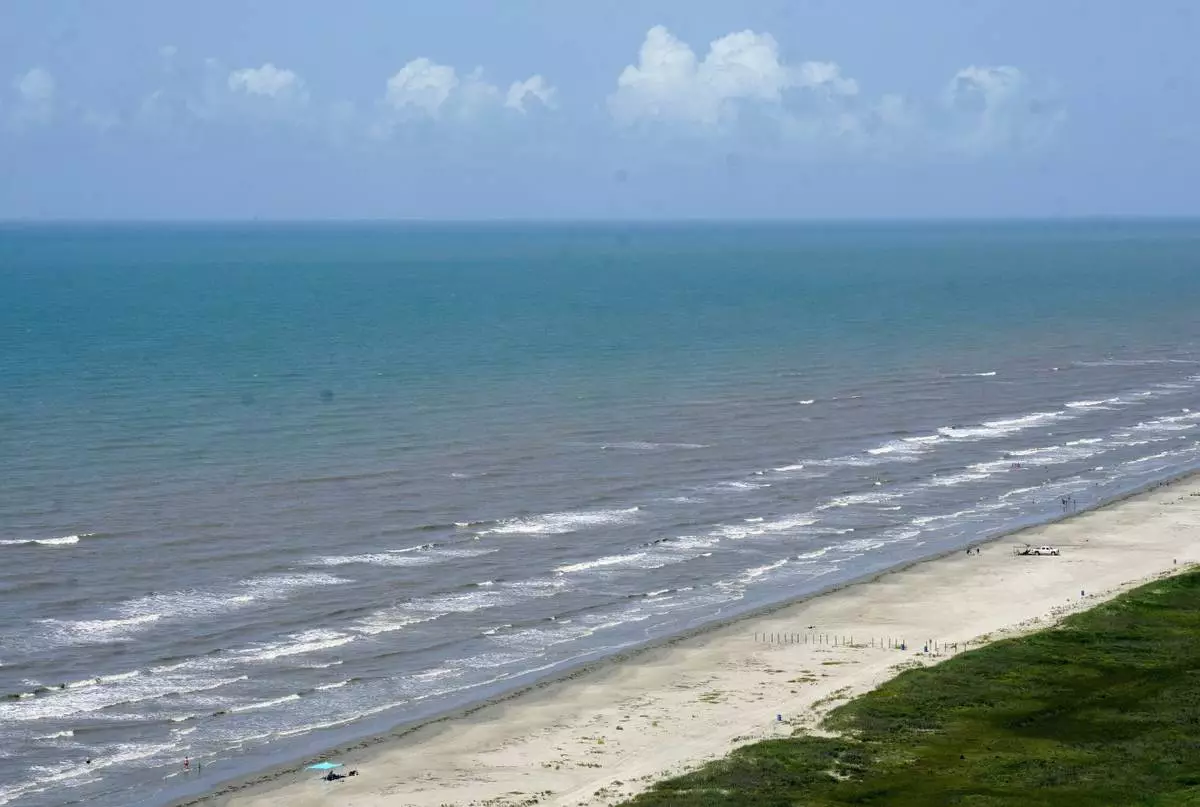
FILE - The water in the Gulf of Mexico appears bluer than usual off of East Beach, Saturday, June 24, 2023, in Galveston, Texas. (Jill Karnicki/Houston Chronicle via AP, File)






















